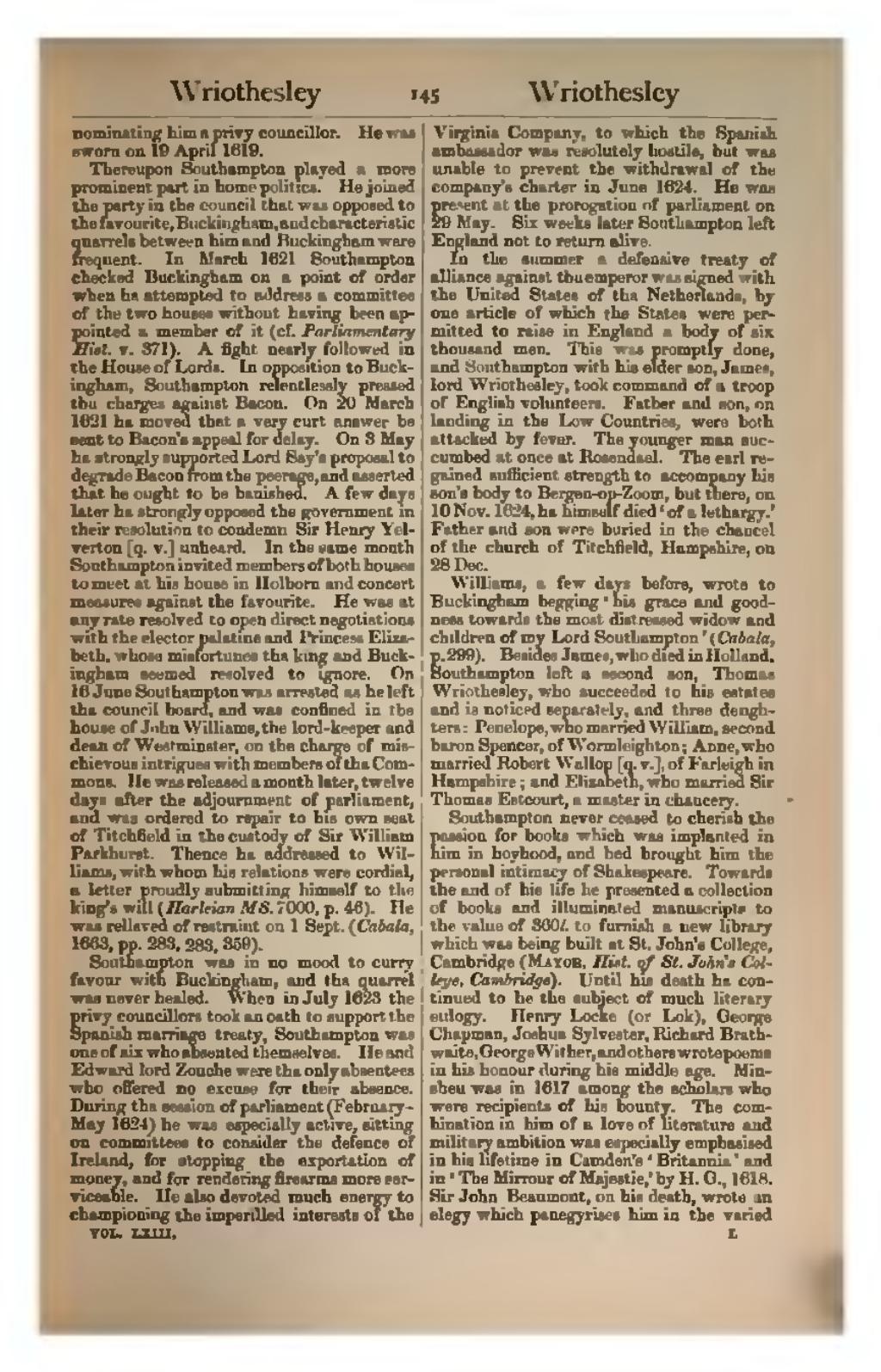nominating him a privy councillor. He was sworn on 19 April 1619.
Thereupon Southampton played a more prominent part in home politics. He joined the party in the council that was opposed to the favourite, Buckingham, and characteristic quarrels between him and Buckingham were frequent. In March 1621 Southampton checked Buckingham on a point of order when he attempted to address a committee of the two houses without having been appointed a member of it (cf. Parliamentary Hist. v. 371). A fight nearly followed in the House of Lords. In opposition to Buckingham, Southampton relentlessly pressed the charges against Bacon. On 20 March 1621 he moved that a very curt answer be sent to Bacon's appeal for delay. On 3 May he strongly supported Lord Say's proposal to degrade Bacon from the peerage, and asserted that he ought to be banished. A few days later he strongly opposed the government in their resolution to condemn Sir Henry Yelverton [q. v.] unheard. In the same month Southampton invited members of both houses to meet at his house in Holborn and concert measures against the favourite. He was at any rate resolved to open direct negotiations with the elector palatine and Princess Elizabeth, whose misfortunes the king and Buckingham seemed resolved to ignore. On 16 June Southampton was arrested as he left the council board, and was confined in the house of John Williams, the lord-keeper and dean of Westminster, on the charge of mischievous intrigues with members of the Commons. He was released a month later, twelve days after the adjournment of parliament, and was ordered to repair to his own seat of Titchfield in the custody of Sir William Parkhurst. Thence he addressed to Williams, with whom his relations were cordial, a letter proudly submitting himself to the king's will (Harleian MS. 7000, p. 46). He was relieved of restraint on 1 Sept. (Cabala, 1663, pp. 283, 285, 359).
Southampton was in no mood to curry favour with Buckingham, and the quarrel was never healed. When in July 1623 the privy councillors took an oath to support the Spanish marriage treaty, Southampton was one of six who absented themselves. He and Edward lord Zouche were the only absentees who offered no excuse for their absence. During the session of parliament (February–May 1624) he was especially active, sitting on committees to consider the defence of Ireland, for stopping the exportation of money, and for rendering firearms more serviceable. He also devoted much energy to championing the imperilled interests of the Virginia Company, to which the Spanish ambassador was resolutely hostile, but was unable to prevent the withdrawal of the company's charter in June 1624. He was present at the prorogation of parliament on 29 May. Six weeks later Southampton left England not to return alive.
In the summer a defensive treaty of alliance against the emperor was signed with the United States of the Netherlands, by one article of which the States were permitted to raise in England a body of six thousand men. This was promptly done, and Southampton with his elder son, James, lord Wriothesley, took command of a troop of English volunteers. Father and son, on landing in the Low Countries, were both attacked by fever. The younger man succumbed at once at Rosendael. The earl regained sufficient strength to accompany his son's body to Bergen-op-Zoom, but there, on 10 Nov. 1624, he himself died ‘of a lethargy.’ Father and son were buried in the chancel of the church of Titchfield, Hampshire, on 28 Dec.
Williams, a few days before, wrote to Buckingham begging ‘his grace and goodness towards the most distressed widow and children of my Lord Southampton’ (Cabala, p. 299). Besides James, who died in Holland, Southampton left a second son, Thomas Wriothesley [q. v.], who succeeded to his estates and is noticed separately, and three daughters: Penelope, who married William, second baron Spencer, of Wormleighton; Anne, who married Robert Wallop [q. v.], of Farleigh in Hampshire; and Elizabeth, who married Sir Thomas Estcourt, a master in chancery.
Southampton never ceased to cherish the passion for books which was implanted in him in boyhood, and had brought him the personal intimacy of Shakespeare. Towards the end of his life he presented a collection of books and illuminated manuscripts to the value of 360l. to furnish a new library which was being built at St. John's College, Cambridge (Mayor, Hist. of St. John's College, Cambridge). Until his death he continued to be the subject of much literary eulogy. Henry Locke (or Lok), George Chapman, Joshua Sylvester, Richard Brathwaite, George Wither, and others wrote poems in his honour during his middle age. Minsheu was in 1617 among the scholars who were recipients of his bounty. The combination in him of a love of literature and military ambition was especially emphasised in his lifetime in Camden's ‘Britannia’ and in ‘The Mirrour of Majestie,’ by H. G., 1618. Sir John Beaumont, on his death, wrote an elegy which panegyrises him in the varied
